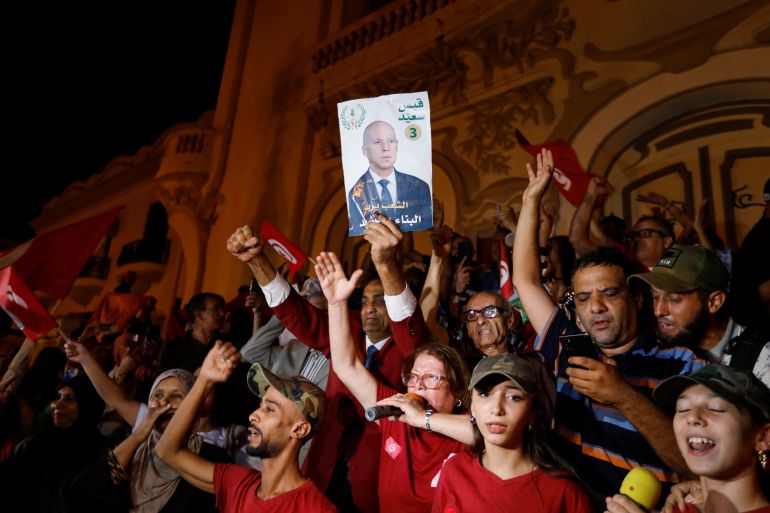Kais Saied set to win Tunisia presidential election: Exits poll
The incumbent in the lead with 89.2 percent of votes as voter turnout was 28 percent in Sunday’s election.
Supporters of Tunisian President Kais Saied celebrate as exit poll shows Saied won the presidential election in Tunis, Tunisia [Zoubeir Souissi/Reuters]Published On 6 Oct 20246 Oct 2024
Tunisian President Kais Saied is on course to win the presidential election with 89.2 percent of the vote, according to an exit poll aired on state TV, solidifying Saied’s rule after a power grab three years ago.
But the Independent High Authority for Elections of Tunisia (ISIE) will announce the official results of the election on Monday evening.
Saied, 66, was running against two rivals, including his former ally turned critic Chaab Party leader Zouhair Maghzaoui, and Ayachi Zammel, a businessman who was seen as posing a big threat to Saied’s re-election until he was jailed last month.
According to the exit poll, Maghzaoui, 59, received 3.9 percent of the vote and Zammel, 47, received 6.9 percent.
The ISIE said voter turnout stood at 27.7 percent in Sunday’s vote. The board’s spokesman, Mohamed Tlili Mansri, said earlier that they were expecting around a 30 percent turnout.
Senior figures from the country’s most prominent political parties, who largely oppose Saied, have faced imprisonment on various charges and have not publicly backed any of the three candidates on the ballot.
Jailed opposition figures include Rached Ghannouchi, the head of the opposition Ennahda party, which dominated politics after the 2011 “Arab Spring” protests to oust President Zine El Abidine Ben Ali.
According to rights groups, since 2019, when Saied was elected, the president has undone democratic gains for the country that were secured through the revolution.
However, Saied rejected the criticism and argued that his actions were to fight the corrupt elite and traitors.
However, political tensions in the country grew ahead of the election after an electoral commission named by the president disqualified three candidates amid protests by opposition and civil society groups.
At the same time, Tunisia is experiencing weak economic growth, high inflation, and unemployment, which have also caused protests.
Last week, lawmakers loyal to Saied stripped the administrative court of authority over election disputes.
The court is seen as the country’s last independent judicial body after Saied dissolved the Supreme Judicial Council and dismissed several judges in 2022.
A year earlier, in 2021, Saied dissolved the elected parliament and rewrote the constitution in a move the opposition dubbed as a coup.
The rewritten constitution was put to a referendum vote and passed with a voter turnout of only 30 percent. The January run-off for the new parliament Saied created with that constitution only achieved 11 percent voter turnout.
